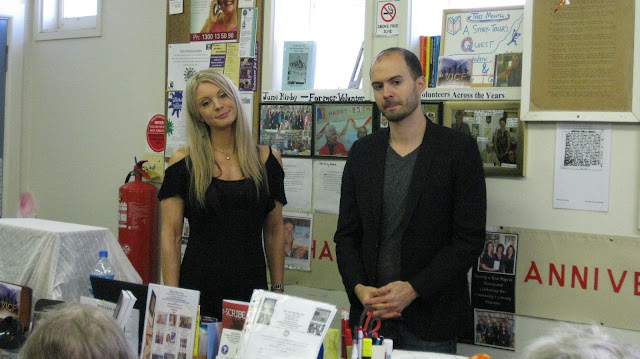A Bep of Light Bursts Through the Shadows: Bep Gomperts Author Talk Reflection - 11am, Saturday, 29 June 2019
Bep’s
memoir was launched in May 2018 at Melbourne
Prior
to that, Bep’s contribution to preserving Holocaust memory was steeped in the
Jewish Holocaust Centre’s Archives Department, translating Dutch documents
and assorted
scriptures into English.
 |
| Attribution: John Nagle 2006 |
Bep continues to carry out this important work
voluntarily today.
In
2014, Bep realised the pressing need to document her own personal survival.
Not only
for her family’s benefit, but for the benefit of her
Birth-country
and the benefit of us.
While
the world is well acquainted with Anne Frank’s diary and the secret annex in Amsterdam
 |
| Bep traces a pre-war family photo featuring her childhood self whilst reading an excerpt of her memoir to her engaged audience. |
...Or
for that matter,
a Dutch-Jewish child having to abandon her true name for
a false one, together with a false life and a false family...
for
the sake of protecting her true family and self.
All
this without ever truly knowing if she would be reunited again with her true
name, her true life and her true family.
The
impact of this responsibility on such a young girl continued long after the
war’s end and travelled right down the bloodline.
Reflection by Paul Karp
Visit Paul Karp's Poetry Website at:
 |
| Bep's Family. Left to Right: Daughter Riwka, Husband Herman, Daughter Saskia and Two of Bep's Grandchildren |
Bep's daughter encouraged her to write about her childhood life during World War II. Bep initially felt her war experience was insignificant compared with others. She had never been in a concentration camp, but like many war survivors she felt the deep emptiness and darkness following the death of her relatives.
Bep originally wrote her book as a testament for her children and grand-children, but a much valued mentor encouraged her to reach out to a wider audience.
 |
| Young Bep in front of 300 Stadionweg Street with her mother and her "onderduikouders" (Hiding/Protection/Pretend Parents) from Heemstede |
In 1942 Bep's father was among the first of Amsterdam's Jewish citizens to be rounded up and taken to Auschwitz concentration camp. Bep and her mother went into hiding. Her uncle suggested that it would be better for Bep and her mother to separate. Their true identities would be easier to conceal from occupying German forces, potentially a life or death matter. The Netherlands was neutral in World War I and people thought it would be the same in World War II.
Bep was taken in with a childless couple during the
'Terrible Hunger Winter' (Dutch Famine).
While her father's parents hosted a German pilot, her mother's parents who ran a 'through house' for Jewish escapees from Poland and Germany did not survive.
'Terrible Hunger Winter' (Dutch Famine).
While her father's parents hosted a German pilot, her mother's parents who ran a 'through house' for Jewish escapees from Poland and Germany did not survive.
Families who took her in under her false persona made her feel like she belonged. Bep described her relationship with her adopted parents as being ironically better than her relationship with her true mother.
Bep considered that her 'second birth' happened on
World War II Liberation Day, on her birthday,
4 May 1945.
World War II Liberation Day, on her birthday,
4 May 1945.
Bep has returned to Europe several times to visit relatives, including her adopted families.
Bep's memoir:
is available from the following institutions/websites:


The Jewish Holocaust Centre Melbourne:
Vignettes of Bep's Holocaust survival have also been documented in the following websites and publications:
(Memories of Plan South)
Your shared insights and the connections forged with our audience truly held resonance.
 |
|
It was so important that you demonstrated just how far-reaching and deeply-encompassing the Holocaust was in The Netherlands, around the world, within all targeted ethnic minority groups and within the Jewish population.
Thank-you for shining a light on the fact that the Holocaust's impact continues long after liberation.
Furthermore...Bep, thank-you for being such a beaming ray of light despite living through such a dark, historical chapter.
You showed the audience that survival is not only about defying doom,
but blossoming, flourishing and nurturing in others the very vibrant,
but blossoming, flourishing and nurturing in others the very vibrant,
infectiously positive spirit that permeates through you.















Comments
Post a Comment